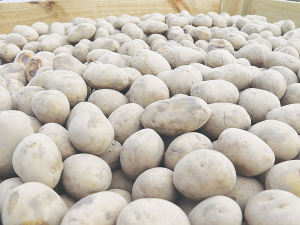Spuds losing ground to housing
Potato growers are losing prime land to urban sprawl, with over 3000ha lost since 2016.
 Potatoes NZ chair Paul Olsen has dismissed claims that there is a shortage of potatoes in the country.
Potatoes NZ chair Paul Olsen has dismissed claims that there is a shortage of potatoes in the country.
The newly elected chair of Potatoes NZ has dismissed claims that there is a shortage of potatoes in the country.
Paul Olsen says assertions about a shortage of potatoes are wrong. He says there is no shortage and there is unlikely to be a shortage this year.
He admits it’s been a challenging year with supply – given the crop losses in one of the major potato growing areas, Pukekohe.
But Olsen says, on average, it’s been a great year for potato growers in Canterbury and the yields could well make up for any losses in the north.
“The one thing that has happened is the challenges faced by the distribution network, especially with the Cook Strait ferries being out of service for significant periods of time,” he told Rural News.
“Because of this and other factors, people may not get the exact choice of potato they like – but there is no shortage.”
Olsen concedes that potatoes are becoming more expensive. However, that simply reflects the additional costs of growing and distributing them.
He adds that everything - from labour, fuel, fertiliser and road user charges - has gone up and these costs are being reflected in the price to consumers.
Another issue has been that with roads blocked or damaged in many areas, trucks carrying potatoes have had to resort to using less direct and lengthy routes, which has added to the cost. Producers of other primary products have also been hit in this way.
However, according to Olsen – who grows potatoes in the Horowhenua – the good news is that the early spuds are now in the ground and new potatoes will be on the menu for Christmas dinner.
Agrisea NZ has appointed Craig Hudson as it's new chief growth officer.
State farmer Landcorp, trading as Pamu, is a forecasting a full-year net profit of around $100 million.
Tony Aitken, chief executive of Ruralco, has been awarded the Excellence in Business Leadership Award at the ANZ Business of the Year Awards.
Global trade has been thrown into another bout of uncertainty following the overnight ruling by US Supreme Court, striking down President Donald Trump's decision to impose additional tariffs on trading partners.
Controls on the movement of fruit and vegetables in the Auckland suburb of Mt Roskill have been lifted.
Fonterra farmer shareholders and unit holders are in line for another payment in April.

OPINION: Here w go: the election date is set for November 7 and the politicians are out of the gate…
OPINION: ECan data was released a few days ago showing Canterbury farmers have made “giant strides on environmental performance”.